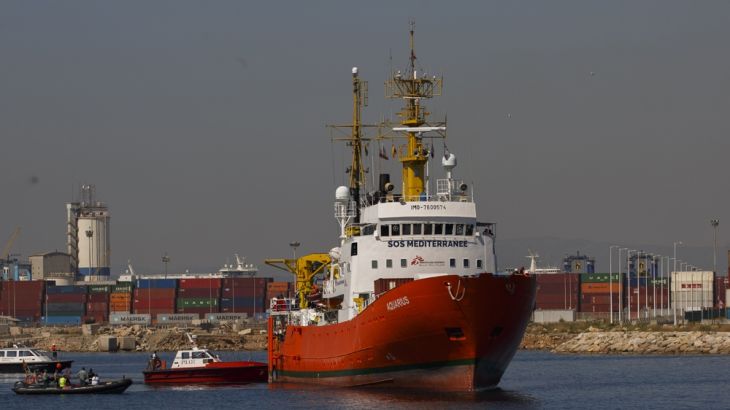
Rescue at Sea: Migrants in the Mediterranean
Why are authorities in Italy and Libya trying to stop NGO vessels from rescuing migrants in the Mediterranean sea?
As long as there is war, poverty and insecurity in Africa and the Middle East, migrants and refugees will try and seek a better life in Europe. For many years now, one of the principal transit routes has been the dangerous sea crossing over the Mediterranean between Libya and Italy.
Images of anxious people crammed into small and manifestly unsafe boats run by human traffickers have become sadly familiar around the world, as have the stories of sinkings and drownings that tragically are regularly attendant on these journeys.
Keep reading
list of 4 itemsUN report charts lethal cost of migration over past decade
Conflict, climate, corruption drive Southeast Asia people trafficking: UN
Bodies of three Rohingya found as Indonesia ends rescue for capsized boat
As a result, and against a background of hardening anti-migrant sentiment in Europe, the problem of how to best respond to and control this phenomenon – and reduce the number of fatalities – has become ever more hotly debated.
For the last five years, EU navies have maintained a presence in the area to discourage people from making the journey. And since 2017, the Libyan coastguard, with the active support of the Italian government, has also become more active, mounting aggressive patrols off its long coastline.
Both the EU and Libyan authorities insist their actions save lives and disrupt the criminal networks that feed off the migrants’ desperation. But their methods, focused mainly on deterrence, policing and security are increasingly at odds with those of other groups operating in the area since 2014 – NGOs running maritime search and rescue (SAR) missions to aid migrants in peril.
In August 2017, Italy asked all NGOs working in the area to sign a code of conduct, which in effect put strict legal and logistical constraints on their ability to operate.
As a result, by mid-2018, only four NGOs were left pursuing SAR missions in the Mediterranean and there had been a number of highly charged stand-offs with the authorities.
In March for example, after a tense altercation between Libyan coastguards and a vessel from Proactiva Open Arms involving 218 migrants and refugees, the NGO’s ship was impounded in a Sicilian port for a month, with the crew held under investigation by the Italian authorities for allegedly “conspiring to facilitate illegal immigration”.
Then in June 2018, Italy refused to let the Aquarius – a ship run by SOS Mediterranee and Doctors Without Borders, known by its French initials MSF (MSF) – disembark 600 rescued migrants in Italian ports. When Malta also declined to accept them it became a Europe-wide dispute.
Eventually, the migrants were off-loaded in Spain, but this and other incidents had a chilling effect on NGOs and for a time left the Libyan coastguard as almost the only rescue option in Central Mediterranean waters.
![Orione, one of two navy vessels which arrived with the Aquarius rescue ship in Valencia, Spain, in July 2018. The ships carried the 630 migrants rescued from the Mediterranean Sea, blocked from docking in Italy and Malta. [Pablo Blazquez Dominguez/Getty Images]](/wp-content/uploads/2018/11/ead419ebf0924777833e366e8fcb56f9_18.jpeg)
Much of the opposition to the NGOs’ activities seem to stem from a belief that their presence encourages migrants to embark on journeys they would otherwise avoid, or even, in the words of Italy’s controversial new Interior Minister Matteo Salvini, that they act as a “taxi service”.
The NGOs reject this claim entirely, but it highlights the fundamental differences between humanitarian groups seeking to save lives on the open seas and those focused on trying to dissuade people from making the treacherous crossing in the first place. It also raises serious questions about the way that long-standing international maritime norms on nautical rescue are allegedly being ignored – with sometimes fatal consequences.
What is clear is that when no one is available to help those in peril, lives will be lost.
In November 2018, the UNHCR said that more than 2,000 refugees and migrants have died on the Mediterranean route this year and that the number of drownings has escalated sharply.
In September alone, the refugee agency said one of every eight people making the dangerous journey towards Italy had been killed. This, it said, was due in part to the “legal and logistical restrictions that have been placed on a number of NGOs wishing to conduct search and rescue (SAR) operations.”
While the agency acknowledged the efforts of the Libyan coastguard in saving lives where it could, it added that any vessel with the capability should be allowed to come to the aid of those in need. Moreover, anyone rescued in international waters should not be taken back to Libya where conditions are not safe.
With access to both sides, we sent filmmaker Paula Palacios to investigate the background to this complex debate and what may happen next.